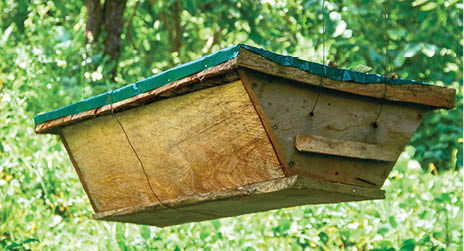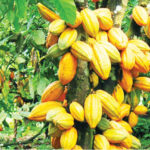In Gashaka and Toungo local government areas of Taraba and Adamawa states, many people, especially women and the youth, are making money from modern and traditional beekeeping business.
Bee keeping was neglected in the past, but with the current economic realities and the constant demand for honey, a lot of people are now engaged in the business, with many making hundreds of thousands of naira annually as income.
The Gashaka-Gumti National Park is the largest park in the entire West Africa region. The vast forest covers a thousand square kilometres and is protected against all forms of unfriendly environmental activities, so the fauna and flora are second to none.
This park is home to lots of bees that find it a safe haven, and they are said to produce the best honey in the country.
Findings by Weekend Trust revealed that Gashaka and Toungo areas, all located within the National Park, produce the highest quantity as well as best top-quality pure honey in the entire Northern Nigeria.
Musa Yakubu, a honey dealer in Serti town, Gashaka LGA, told our reporter that beekeeping and honey business is very lucrative but it was neglected because of lack of knowledge and business initiatives by the local inhabitants until recently when there was high demand for honey from Gashaka.
He said the demand for pure honey exceeds local production, which is why honey is very expensive—a development that caused more of the local farmers to go into honey production and business.
According to him, there is high demand for honey from Gashaka because it is pure and high in quality.
He said Gashaka-Gumti National Park provides a safe colony for bees and they feed on the best flowers that are rarely found in other parts of Nigeria.
“Currently, a litre of Gashaka honey costs between N3,500 and N4,000 while a 20-litre Jerry can is sold at N80,000. A lot of the beekeepers are making good fortune annually even though many of them lack the capacity to produce large quantities of honey.”
Another dealer, Musa Yakubu, told Weekend Trust that 70 per cent of honey consumed in Northern Nigeria is sourced from neighbouring Cameroon Republic, but that if farmers in Gashaka-Gumti and other forest reserves are encouraged and supported, the gap would be bridged.
He said unlike forests in Nigeria where deforestation is taking place on a daily basis, in Cameroon the reverse is the case, where there are strict rules regarding logging and other illegal activities.
In Nigeria, wildlife including bees were threatened by deforestation and other practices that made many forests unsafe for bees and other inhabitants.
In Gashaka-Gumti National Park, the case is different as the entire forest is protected and the wildlife including bees are protected, a situation that enables harvesting of honey in large quantities from both Gashaka and Toungo end of the National Park.
Similarly, the traditional method of harvesting honey using fire and pesticide is not allowed as trained Rangers are always on patrol of the park, supported by helicopter patrol provided by Africa Nature Investors (ANI—a nongovernmental organisation).
Honey from Gashaka-Gumti areas is not adulterated unlike those from other parts of the country.
A honey trader from Kano, Sule Dauda, said Gashaka honey is rated among the best in the country and that is why it has market value.
Weekend Trust gathered that despite the potentials of bee production in the Gashaka area, only few people are into both modern and traditional beekeeping.
“Bee keeping is a very lucrative business but it was neglected and the government is not supporting the business,” a consultant on bee keeping said.
The consultant, Salihu Zaria, told our reporter in an interview that N60 billion could be earned from honey production by bee keepers within the Gashaka-Gumti National Park axis.
He said the business could engage many value chains, unfortunately, it was neglected by the local inhabitants while the government at the state and federal levels are not supporting those engaged in the business.
He said he was employed by Africa Nature Investors (ANI) to train beekeepers in Gashaka and Toungo area and he had trained over 150 bee keepers in the two areas.
He said those he trained were provided with bee boxes and other equipment by ANI and are harvesting honey and making good money.
He stated that ANI, which is currently providing technical assistance to Gashaka-Gumti National Park, supports local inhabitants to engage in many ventures, including bee keeping, to boost their income.
Salihu Zaria explained that the training sponsored by ANI had empowered several farmers through bee keeping business.
According to him, if potential bee keeping would be utilised in Gashaka-Gumti National Park areas, the nation’s demand for honey could be substantially addressed.
“At N8,000 per litre of honey, if 500 farmers would key into bee keeping, their income per annum will be in the region of millions of Naira,” he said
Salihu said modern bee keeping is environment friendly as bees are not killed, adding that the bee is the source of honey and when destroyed, there will be no honey.
He said the decline in honey production in Northern Nigeria was because the traditional method of harvesting honey was unfriendly to both the environment and the bee.
“In modern beekeeping, pesticide and fire are not used during honey harvest and that is why honey produced through modern beekeeping is unadulterated. That is why Gashaka honey is rated the best in taste and quality,” he said.
A bee keeper at Mayo Selbe, Nuhu Sani, one of those trained by ANI, revealed that his income has increased because the method is yielding more quantity of pure honey and the market value is high.
Mr David Peter, ANI communication officer, told Weekend Trust that the African Nature investors are providing technical assistance to Gashaka-Gumti National Park to protect the park against poachers, loggers and other illegal activities.
He said ANI is also supporting local communities to engage in various economic ventures and creating awareness on negative impacts on unfriendly environmental activities such as poaching, logging, illegal mining, among others.
David Peter stated that hundreds of farmers trained on bee keeping are from Gashaka, Bodel Maiidanu, Mayo Selbe, Mayo Fandam, among other areas.

 Join Daily Trust WhatsApp Community For Quick Access To News and Happenings Around You.
Join Daily Trust WhatsApp Community For Quick Access To News and Happenings Around You.


